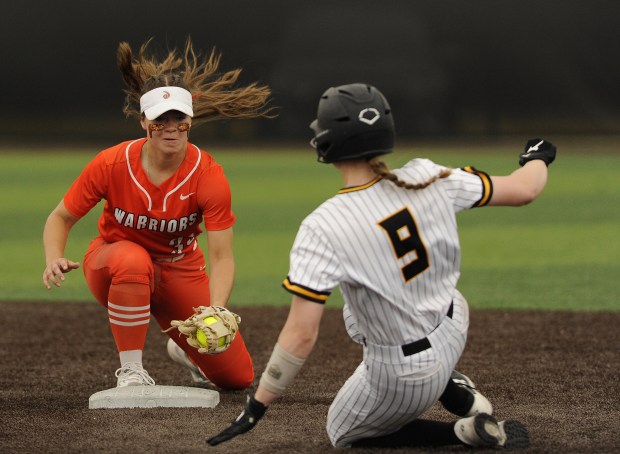In the run-up to last November’s presidential election, and in the months following it, Americans have repeatedly said that the economy is far and away the most important issue on their minds. With a new and unpredictable tariff regime instituted at the beginning of April, that’s not likely to change anytime soon.
For ordinary people, economic decisions are part of their everyday lives. Decisions must be made about how to allocate expenses for groceries, whether they’ll be able to afford a vacation this summer or which extracurricular activities their kids can take part in. That involves planning for the future, figuring out what they’ll be spending money on a year from now.
And it’s one reason Cook County homeowners have said that they are deeply concerned about property taxes, which can vary greatly depending on changes to levies, the turbulence of the commercial tax base and the decisions of appellate bodies in the assessment system.
In a survey of registered voters conducted in December by renowned pollster Jason McGrath at GBAO, 42% of Cook County homeowners listed property taxes as a top issue they want local officials to focus on this year. And 1 in 4 Cook County households in the past three years have seen their property tax bills spike by 25% or more, according to an assessment by the Cook County assessor’s office.
Last year in the south suburbs, the typical homeowner’s property tax bill rose by 20%, while the typical commercial bill dropped correspondingly. As elected officials across Cook County, we heard from residents worried about these unexpected spikes, scared that they might lose their homes or be forced to move. They felt powerless to do anything about it.
In many cases, they’re right. As it’s set up, our property tax system offers little recourse for those who see their bills go up astronomically, even if that leaves them unable to pay.
That’s why the assessor’s office worked with state legislators to craft a property tax relief program that was filed this February as SB1978 by Sen. Patrick Joyce and HB3808 by Rep. Justin Slaughter. The “circuit breaker” proposal would offer relief to homeowners who have seen their tax bills spike by more than 25% from one year to the next. It would cover the large tax increases in the south suburbs from last summer and protect residents going forward.
Twenty-nine other states already have a circuit breaker program on the books, serving as an added layer of protection for homeowners. We applaud Cook County for taking an important first step this month by creating a $15 million relief fund that will provide one-time payments of $1,000 to eligible households.
To help show the impact that a more permanent circuit breaker program would have, the assessor’s office has released a new data dashboard. It helps illuminate the scale of the property tax problem and allows homeowners to see whether they might qualify for relief.
Our hope is that this dashboard, along with town hall meetings such as the one we held in Maywood, also opens the conversation about the program to broader democratic deliberation — something our local property tax system has been missing for too long.
We want to emphasize that the numbers on this dashboard are shocking: In Maywood, where one of us serves as mayor, 1,300 homeowners saw a bill spike of 25% or more, with the typical tax bill increasing by $2,500.
In Park Forest, nearly two-thirds of households saw this level of increase. Collectively, these residents paid $7.6 million more in property taxes. This is not the mark of a sustainable system.
In Park Forest, these spikes came even though Mayor Joseph Woods and his colleagues on the village board did not increase the village’s budget or reliance on property taxes in five of the past seven years, but saw a shift of the tax burden between property types. A state-funded circuit breaker managed by the assessor’s office would be the first of several steps to rectify the disproportionate reliance on property taxes for public service delivery.
We believe that a fiscally responsible circuit breaker program can be funded by about $200 million annually from the state. In the context of a $55 billion Illinois budget, that is a relatively small amount.
The program can be set up without any new administrative bloat, since the assessor’s office already has much of the infrastructure in place to administer a circuit breaker. Through an agreement with the Illinois Department of Revenue, the office has access to most of the data needed to automatically enroll qualifying homeowners.
If lawmakers decide that it would be better to ask homeowners to apply, the office already processes tens of thousands of exemption applications every year.
That said, we know that this is a tough budget year. With federal cuts to health grants, education spending, medical research and a multitude of other areas, Gov. JB Pritzker and leading Democratic legislators are right to suggest that we need to make sure we can fund basic services for everybody. Like homeowners, that involves making difficult decisions about trade-offs.
To echo Cook County Board President Toni Preckwinkle’s recent acknowledgments, Mayor Woods in particular notes that solutions must include a structural rethink of our tax system so that stability and fairness are not at odds. We pledge to continue working with the county and state for both stability and fairness.
We see ourselves as advocates for homeowners buckling under the impossible weight of property taxes. While it’s up to legislators to balance the many competing priorities we have, we believe that we need to start putting the details to paper at some point on a program that is a necessary safeguard for our residents. That’s how we figure out a solution to a problem that seems intractable.
But the only way to ensure that you, as homeowners, have a say in the decisions that get made about our collective economy, both in Cook County and Illinois, is to pull up a seat at the kitchen table and make your voice heard. For those who think that legislation like this is a good idea, we encourage you to contact your local state representative and senator and tell them to support this bill.
Nathaniel George Booker is mayor of Maywood. Joseph A. Woods is mayor of Park Forest. Fritz Kaegi is the assessor for Cook County.
Submit a letter, of no more than 400 words, to the editor here or email letters@chicagotribune.com.




